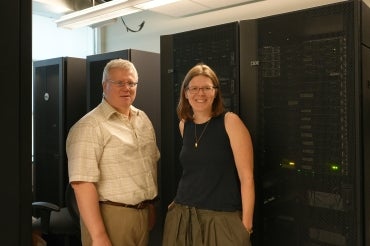U of T engineering students encouraged to consider sustainability when designing future AI systems

Professors Hans-Arno Jacobsen, left, and Natalie Enright Jerger of the Faculty of Applied Science & Engineering are part of a team that is training computer system designers to integrate sustainability practices into the development of AI and machine learning systems (photo by Jenny Lee)
Published: September 16, 2024
The growing global adoption of artificial intelligence technologies, including machine learning, has created a new sustainability challenge: AI systems are energy-intensive – and the more sophisticated they become, the more resources they require.
To help address the issue, a team of experts including the University of Toronto’s Hans-Arno Jacobsen and Natalie Enright Jerger – both professors in the Edward S. Rogers Sr. department of electrical and computer engineering at the Faculty of Applied Science & Engineering – are launching an initiative that aims to align Canada’s tech investments with its vision for a sustainable, carbon-neutral future.
The Sustainable Data Systems for Data Science (SDSDS) project aims to train a new generation of computer and data scientists who can combine comprehensive technical skills with sustainability awareness. The project recently received a $1.6-million Collaborative Research and Training Experience (CREATE) grant from the Natural Science and Engineering Research Council of Canada (NSERC).
“A majority of students are unaware of how sustainability informs responsible development of platforms and systems because, frankly, there just aren’t many courses or learning paths available to them in this area,” says Enright Jerger, who holds the Canada Research Chair in Computer Architecture and is director of the division of engineering science.
“Another crucial component of this project is to equip our students with knowledge transfer strategies so they can seed these ideas in the workforce. Today’s trainees becoming tomorrow’s trainers.”
The SDSDS team propose training future computer systems designers to adopt a green approach when developing data analytics platforms and systems. The approach would apply to all aspects of the life cycle of development and deployment – such as hardware infrastructure, software systems and application domains.
To advance knowledge and dialogue on the issue, SDSDS will look to hold cross-university seminars on sustainability challenges and will offer courses on sustainable data science, along with summer school programs focused on energy-efficient software and hardware platforms.
The researchers also aim to connect students with industry via internships and applied research projects, enabling them to gain exposure to current challenges and facilitate cross-pollination of knowledge between industry and academia.
“The awareness about AI’s environmental impact is growing, but there is an expertise gap on how to address this very real problem – not just after the fact, but at inception. SDSDS aims to bridge this gap and prepare for the future resource demands of AI-driven industries,” says Bettina Kemme, professor of computer science at McGill University and team lead at SDSDS, which also includes Semih Salihoğlu of the University of Waterloo, Oana Balmau of McGill University and Essam Mansour of Concordia University.
“The potential of AI and machine learning systems are seemingly limitless,” says Jacobsen, who is the Jeffrey Skoll Chair in Computer Networks and Innovation. “Yet the true genius lies in building machine learning systems founded on sustainability principles. That’s real innovation.”



